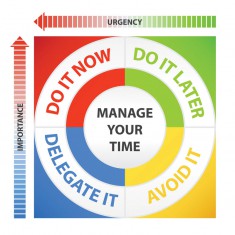 Secrets of Success
Secrets of Success
By Donna Thomson
“Until we can manage time, we can manage nothing else.”
-Peter F. Drucker
IN JULY 2008, global business executive Herta von Stiegel led a group of 28 multinational climbers, including seven people with disabilities, to the top of Mount Kilimanjaro to raise money for charity. What von Stiegel didn’t know is that during her ascent, she would learn valuable lessons for the business community—lessons about leadership, time management and teamwork. She later wrote a book and made a documentary film about her group’s climb, both titled The Mountain Within. For von Stiegel, knowing how to pack for the journey, when to turn back and how long to stay at the top were all key issues of time management in her pursuit of reaching the summit. The author presents these challenges as strong metaphors for both personal and professional success.
Of course, not everyone is going to climb Kilimanjaro to learn personal lessons about time management. But generic instructional websites may not be entirely helpful for people with disabilities either, because they may face challenges in this area that are unique and individual. Effective time management is a critical ingredient for success, but it’s tricky to achieve. Good time managers tailor their strategies to maximize their personal strengths and to camouflage weaknesses. But they’re flexible, too, because everyone has life events that can sabotage even
the best-laid plans.
The experts claim that breaking up tasks into smaller pieces and slotting them into a carefully constructed diary will enable people to be successful in meeting their goals, if they are disciplined. But what if someone has the unpredictability of outside essential services built into their life? What if daily tasks take longer to accomplish than for a person without physical challenges? How can people with disabilities become effective managers of their time?
The general principles of good time management apply to everyone, but people with disabilities will have to personalize their plans to meet their individual objectives, while taking their challenges into account.

Here are some tips to help you cope:
1 Know your strengths
Reflect on times in the day when you are most productive. These hours can be colour-coded in your agenda as prime times for working toward your goals. Everyone has “time-wasting habits” such as hours spent flipping television channels or chatting with friends on Facebook.
An honest tally of personal bad habits will help to free additional “prime time” in the agenda.
2 Assess your environment
Does your working environment maximize your output? If it doesn’t, explore options for changing it. Working from home full- or part-time may be possible. Many managers are willing to look at modifications that increase productivity, especially on a trial basis.
3 Evaluate your challenges
Sometimes personal challenges are directly related to time and productivity. A person who uses a wheelchair may require more time to dress for the weather in winter months than in summer. Medications and their side effects will perhaps have an impact on how a daily agenda might look. Whatever the challenges, working ahead of deadlines when possible will ease stress and maximize chances for success. So will saying “no” to tasks that are too onerous or impossible to complete within a reasonable timeline. Communicating with confidence about what you can and cannot achieve within a given time frame demonstrates responsible leadership: clarity is always appreciated in both professional and personal relationships.
4 Delegate
Effective time managers are often good leaders. They know that delegating some tasks is critical to success in attaining personal and professional goals. Mobilizing and coordinating a team with shared objectives is an art that starts with conversation. One way to enlist supporters? You could open the conversation with “I’m working on a new project and am looking for a partner or two. Let me tell you what’s involved.” Share your list of tasks and ask the colleague or friend to claim one. Next, slot that person/task into the agenda.
5 Reward yourself
When tasks are completed and deadlines are met, it’s important to celebrate success, even if it’s just with a coffee break or a high-five with a friend. Moving directly from one completed task to the next challenge without a pause for satisfaction is energy sapping and ultimately discouraging.
Fun is just as important as work, so don’t forget to schedule time for leisure. Personal aspirations require goal- and task-setting. Arrangements for social outings belong in the agenda, too.
6 Manage your stress
If a work or study environment is fast-paced and stressful for you, it may be that way for others as well. A few private conversations with trusted colleagues could reveal the need for a group approach to slowing the pace and reducing expectations to healthier, more manageable levels.
Mahatma Gandhi once said, “There is more to life than increasing its speed.” Time management is a skill worth mastering because no one wants to squander the opportunity to realize one’s goals. But the purpose of using time management tools is not just to increase the speed of life—it’s to develop an overall sense of control and balance. And that includes the good times, the bad times, the fast times and the slow times.
Donna Thomson lives with her husband, Jim Wright, in Ottawa where they support their son Nicholas in his care home. Donna is the author of The Four Walls of My Freedom and teaches advocacy skills to family caregivers.

HEALTHY STRATEGIES
Avoid unnecessary stress: Know your limits and learn to say no.
Alter the situation: Express your feelings, be assertive and control your agenda.
Adapt to the stressor: Enlist supporters to share tasks, reframe your problem and extend the timeline if possible.
Accept the things you cannot change: Don’t try to control the uncontrollable.apt to the stressor: Enlist supporters to share tasks, reframe your problem and extend the timeline if possible.
Make time for fun and relaxation: Do something you enjoy every day, and remember to laugh!
Adopt a healthy lifestyle: Exercise, a healthy and balanced diet, fresh air, being in a natural environment and even having a pet are all proven stress relievers.
There are downloadable programs that can facilitate the coordination of a team working towards the same goal: one example is Tyze (tyze.com). Google Calendar provides a range of useful templates, and a free smartphone application called Remember The Milk (rememberthemilk.com) is another nifty time management tool. Choose
the online platform that best meets your personal needs.














